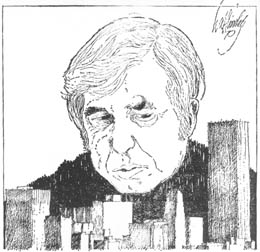What Just Happened?: The meaning of McGinn’s win
Photo: Jen Nance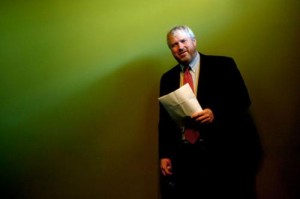
There is a story being told (see Grant Cogswell’s piece in The Stranger, “Late Returnsâ€) today about what Michael McGinn’s big win means.
It goes like this: McGinn raised an army of volunteers, called them into service to reverse the defeat of the Monorail, slap passive aggressive Seattle in the face and crush the Establishment. It is a story full of sound and fury. But is it true?
I don’t think so. This story is sewn together with scraps of past resentments and frustrations at the “Seattle Way,†and the Seattle Establishment each of which we have all blamed for whatever civic ailments we find most irksome. It is a story of scores being settled. But it does have one thing correct: our city will never be the same.
The reason is that McGinn’s win is far more significant than some might think and powerful because it sets the stage for true transformation of our city. The volunteers are the cast with Michael McGinn as the leading man. But the star, I would argue, is the people of this city and the story is about the resolution of a dialectic—an argument between two small groups with divergent views of the city’s future—that has bedeviled the city for 40 years.
If only this was true . . . 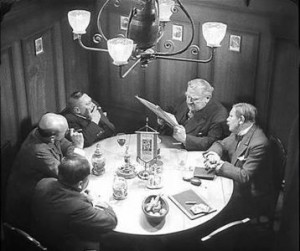
First, let us do away with the idea that Seattle has an Establishment; a room full of old white men smoking cigars and pondering the future of the city. If only such a thing existed. You would find me outside the door begging for 15 minutes to persuade them (with a power point of course) to adopt my agenda. I would wait for years, because, after all, the men inside control immense wealth, and the machinery of political power. With a shrug and a grunt they could unleash all that power to do all kinds of things like up-zone Laurelhurst, get the major development projects completed and create a new neighborhood in places like Interbay.
The Seattle Establishment?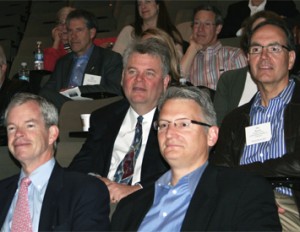
However, this idea of the Seattle Establishment is a fantasy. It doesn’t exist. Developers have failed completely to dominate the discourse in the city. Their internal divisions have rendered them essentially inoperative as a political force. During the land use battles of the last several years Vulcan and Wright Runstad feuded over incentive zoning and whose projects would be most harmed. Industrial lands consumed them as they fought over whose ox would be gored and over where the boundaries would be drawn. Incentive zoning, which they uniformly hated, was passed in spite of their efforts to stop it.
What about the business community? True they mustered forces effectively to foist Joe Mallahan, the Mayor of Tunnel City, on Seattle. It was a breathtaking performance, with the Governor and the Legislature organizing themselves into a phalanx of consistent messaging: tunnel or else. Some might point to their failure as the “death of the Establishment.†But the backward facing folks who created this critical mass are similarly divided over a broad agenda for the city. They opposed the Monorail and Sound Transit but supported the repeal of so called “head tax,†a small tax supporting bike and pedestrian infrastructure, while simultaneously urging that billions of tax dollars be spent for a tiny stretch of buried highway. The business community is really an unrepresentative group of people who are clutching on to the status quo, with no vision for the future other than complaining about taxes and wrapping their arms around the legs of Boeing and Microsoft. And they spent thousands of dollars on a losing candidate in the last election.
Business as usual . . .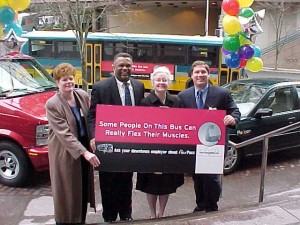
What about the NIMBYs? It is true that Seattle could field a team for the NIMBY Olympics with Jeannie Hale (Children’s Hospital is destroying Laurelhurst!), John Fox (saving Laurelhurst from Children’s will help homeless people) and Pat Murikami (Transit Oriented Development will turn Southeast Seattle into a Bombay slum) as star players. But the NIMBYs are only as good as the level of fear on City Council. More panic on the Council’s part about up-zones or new land use strategy hands the NIMBYs victories now and then, enabling them to blow up individual projects. But the NIMBYs have no vision either; they have no concept of the city’s future only their past.
NIMBYs have no vision. 
No, none of these frightened backward looking groups represent the Seattle Establishment. Rather they are the groups that have shown up to stop change. And occasionally (like with TOD or Children’s) they form an axis now and then, aligning, for example, the interests of homeless people with the interests of single family gentry. But this is hardly a movement amounting to an Establishment.
So what did happen? My theory is that the people of this city are ready for a new story. They are rejecting the Forward Thrust vs. Lesser Seattle, Spy versus Spy, conflict which has defined politics in our town since the 1970s. These two parties were pretty clear, the latter focused on big capitol projects the former focused on keeping Seattle a small town dominated by fishermen and descendents of pioneers. One group supported the Nordstrom Parking Garage (remember that one) and the other opposed it, for example. The Thrusters saw the garage as supportive of growth which would create economic development and the Lessers saw it as another attempt to pretty up Seattle for Yuppies and people from out of town.
Jim Ellis: Thesis 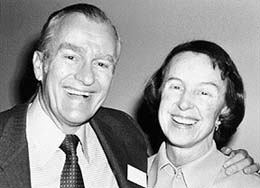
Emmett Watson: Antithesis
The old Thrusters were behind the tunnel and oddly so were many of the Lessers. The Thrusters loved all the financing and concrete because after all, concrete and financing mean progress. The Lessers saw the tunnel as a solution for capacity to prevent congestion. City’s are about cars and the city needs less congestion and more mobility. Suddenly in Joe Mallahan the two sides of Seattle’s heretofore blood enemies found common cause.
And they lost. Both the view that we will build highways to economic recovery and that we should board up Seattle’s windows and doors to new growth were soundly defeated by the McGinn campaign. Their combination gave Seattle voters a clear picture of the co-dependent grip which was holding their city hostage. So, instead of insider transitions, which would give the Lessers something to rail at and the Thrusters something to game, the McGinn transition is open source, accessible and maddeningly transparent.
Cymbals of change; photo: Publicola
McGinn and his band of advocates have reset the game clock and the rules of the game. This isn’t about beating the establishment, but rather about the future. The new story is not about the internecine struggle between small, unrepresentative groups working the City process with fear and anxiety about what will happen if we do or don’t do a big project, but rather about building a common cause for a sustainable city. People believed this new story about all of us working together for a common vision of where we live, a future together not fraught with fear but with hope.
Ironically, the demolition of the old Thrust versus Less narrative elevates and weaves together the highest ideals of both sides. The Thrusters believed in taking risks on cleaning up Lake Washington and building transit even though the expensive was bourn today with benefits in the future. The Lessers were the epitome of ruggedness and community, banding together to build a city in distant, wet and tree infested land always resisting freeways and more concrete in favor of local people and neighborhoods.
So McGinn’s election is about this city and its transformation into a different place, rooted firmly in the best of its past and reaching up towards its persistent ideals of community, place and self-sufficiency. The outcome is not assured, but the momentum is going in the right direction. Anyone who was at the event at New Holly (a kind of McGinnaugural ball) last week understands what I am talking about. This is something different.
It is an end to force fed megaprojects and a step toward more transparency. It means welcoming growth and planning for it rather than pretending like growth won’t happen. It means thinking big and being innovative; think “bonds on bikes.”
Michael McGinn:Synthesis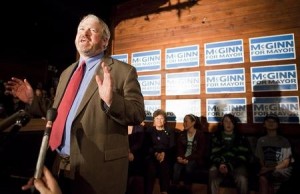
Understanding what the McGinn win means is important. Seeing it as the latest in a tit for tat, us versus them, smart versus dumb battle denigrates its promise and dooms it to repeating the same old tired battles. The McGinn win is nothing less than a win for the future of our city through a synthesis of two older views of what that future should be.
>>>
>>>
>>>

